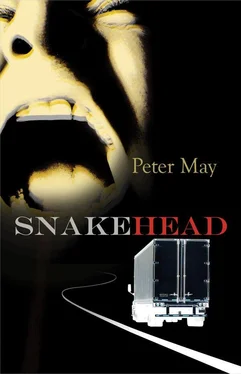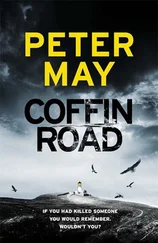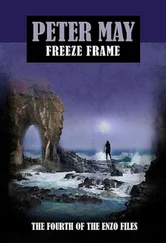They passed a mural on a side wall depicting the 1836 Battle of San Jacinto, at which Sam Houston had led his Texan army to victory over Santa Anna and freedom from Mexico. They took a right into Main and drove past the impressive square of the Walker County Courthouse dominating the centre of Huntsville, then left into Sam Houston, drawing in beside a colourful display of birds of paradise set behind a low brick wall. The morning air was still cold as they stepped out on to the sidewalk, and laced with the smell of fresh coffee drifting down from the Café Texan. They walked past Scottie’s antique store, a window cluttered with bits of pottery and old furniture, shelves piled high with cheap bric-a-brac the owner liked to call ‘memorabilia’. The nonsmoking section of the café was empty. A sign in the window read NORMA’S SKIN AND NAILS UPSTAIRS. Margaret had seen the sign often and always wondered where the rest of Norma was kept.
The Café Texan was an old-fashioned Southern breakfast-diner. Low stools lined up along a red counter. Pots of Kona coffee sat on hotplates behind it. A large-breasted girl in hotpants served eggs over easy and grits and pancakes with maple syrup, to customers in Wranglers and Stetsons. Country music played over the sound system. On execution days and for several days beforehand, the Café Texan played host to the country’s media whose reporters would cram the place in the early hours speculating on whether or not there would be a last-minute reprieve. In recent years, those had been few and far between, and they were drawn now only by the crowds of protesters that gathered outside the Walls Unit in the run-up to controversial executions.
Li attracted some curious looks as an older woman with steel grey hair came up to them and said, ‘How y’all doin?’ and took them to a table at the back where a pasty-faced middle-aged man in a crumpled suit stood up to greet them. He had cut himself shaving, and his thinning grey hair was a little dishevelled. ‘Jesus, Felipe,’ he said. ‘You any idea what time I had to get outta my bed to get here?’
Felipe grinned and shook his hand. ‘No rest for the wicked, Dan.’ He turned and introduced Margaret and Li, then told them, ‘This is Daniel L. Stern, attorney at law, smartest lawyer this side of the Mississippi, and just as crooked.’
‘You only ever gotta be as crooked as the law itself,’ Stern said, grinning back at Mendez. He sat down again. ‘Damn, this is good grub. What you folks having?’
But none of them was hungry. Li and Margaret ordered coffee, and Mendez an iced tea. They watched Stern devour a double helping of grits smothered in maple syrup.
‘Don’t get a chance to eat like this too often,’ he said. ‘Wife says I gotta watch my waistline.’ And almost without pausing to draw breath, he added, ‘So this is some case you’re throwing at me, Felipe. Scary stuff. Jesus, if this ever gets out, there’ll be rioting in the streets.’ He looked at Li. ‘And you people had better run for cover.’
‘Then you know how important it is to keep this under your hat,’ Mendez said.
‘Hey,’ Stern chided him. ‘I think I know a little bit about client confidentiality, Felipe.’ A serving of French toast arrived, and he poured on more maple syrup. ‘So the way I see it, we have here a young woman who was forced to leave home in order to have her baby. Could the authorities have forced her to have an abortion?’ He raised a hand to preempt any reply. ‘Never mind, we’ll say they could.’
Margaret studied Stern with distaste as he shovelled French toast into his face. He was a fast-mouthed conveyer of ersatz justice, delivered on tap to the man with the most dollars in his hand. She glanced at Li and knew that he did not like him any better than she did. But with his sister’s freedom at stake, he was keeping his feelings to himself.
‘After the Tiananmen Square massacre in eighty-nine, the one-child policy became grounds on which lots of Chinese were granted asylum in American courts.’ Stern winked at Felipe. ‘See? I didn’t really go back to bed after your call. Been doing my homework.’ And he turned back to Li and Margaret. ‘But after the Golden Venture went aground off of New York, the US reversed its policy on that, until President Clinton announced in ’97 that the one-child policy should be considered political persecution. So your sister,’ he said to Li, ‘was driven from her home but lost her baby and knew the only way she was gonna have the freedom to fulfill her human right to have children was by escaping the country of her birth.’ He shrugged. ‘It’s irresistible stuff. No judge in an American court’s gonna send her back.’ He stabbed a finger at Li. ‘And you’ll testify if needs be? How she’s been separated from her daughter for two years? And how you’ve had the sole responsibility of looking after the child in her absence?’
Li had no idea what kind of trouble this might get him in with his embassy, but he nodded. It was all true. ‘Sure,’ he said.
‘Good.’ Stern seemed very pleased with himself. ‘And if Professor Mendez and Dr. Campbell approve a diet that you promise to see she sticks to, then I figure we’re home free.’ He finished off his French toast, drained a mug of coffee and wiped his face with a paper napkin. ‘Okay,’ he said, and stood up. ‘Let’s go get her outta there.’
* * *
Armed correctional officers of the TDCJ controlled the front and rear entries to the College of Criminal Justice at the top of the hill. There was also a substantial police presence cordoning off the college from the rest of the campus.
The prisoners had been brought over from the Holliday Unit on two buses an hour earlier and were being held in the Eliasberg Room, a brick-walled conference room at the back of the court. Its conference table had been removed and replaced by rows of plastic chairs. Judge McKinley, a laconic black man in his forties, who presided over the immigration court at Goree, had been given chambers in a library room through the wall from the prisoners.
The officers handling the prisoners were still wearing their Tivek suits and HEPA face masks, but the judge, on assurances from Department of Health officials that none of the prisoners was infectious, had refused to take any precautions and entered the court as usual wearing his black gown over a charcoal grey suit. On a bench, flanked by the Stars and Stripes on one side and the Lone Star of Texas on the other and set high above the court officer and a Chinese translator, he looked out over the rising tiers of an almost empty courtroom. There were three tables set out front, one in the middle for the prisoner and one on either side. The INS lawyer, a young, anxious-looking woman in her early thirties, sat at one of them the other was for representatives of the accused. But of the sixty-seven people due to appear before the court that day, only Xiao Ling had any legal representation.
Stern sat looking bored, leaning back chewing reflectively on the end of his pencil as the first immigrants were brought before the judge. Margaret sat at the back of the courtroom watching proceedings with a detached sense of horrified curiosity. Illegal immigrants had few, if any, rights. The court was required to allow them to make contact with their consulates, and they had the right to legal representation. But virtually none of them had access to a lawyer, never mind the means to pay for one. An anonymous Chinese in a crisp, dark suit sat very erect about three seats away from Margaret, watching proceedings and scribbling occasionally in a notebook on his knee. Margaret guessed he was from the Chinese consulate. Li had gone earlier to speak with his sister, and was now waiting outside the court until she was called. Margaret wondered if he was trying to avoid the consular official.
Читать дальше












